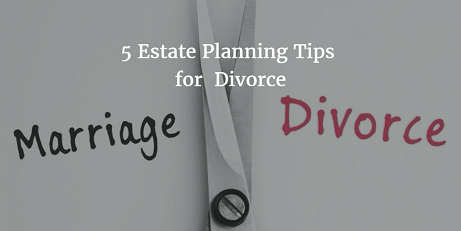
1. If you already have an Estate Plan, Get a New One
In most cases, getting a divorce will essentially invalidate your Trust or Will if you have one. However, it should be noted that your former Will or Trust will only be invalid once the divorce is finalized. Simply filing for divorce changes nothing in the eyes of the California Probate Court. This is why it can be important to draw up new documents as soon as is practicable. In other words, as soon as you know you’re headed for divorce, and you’re certain you don’t want your spouse to have control of your assets if you die – or your health and financial decisions should you become incapacitated – see an attorney right away. Some divorces can take years, and while death or mental incapacity may seem unlikely, you really never know what might happen. When it comes to divorce and Estate Planning, it’s better to be safe than sorry.
Estate Planning mid-divorce can seem complicated if you’re still unsure what assets you’ll have after the divorce. I recommend getting a general plan down on paper, and then adding specifics or additional assets at a later time. Remember that your estate plan includes important documents like your Power of Attorney and Healthcare Directive as well. Amendments or “codicils” can always be done later by your Estate Planning attorney.
2. If you don’t have an Estate Plan – Get One
If you don’t have a Will or Trust and something happens to you during the Divorce process, generally all of your assets will go to your spouse. Even if you have significant separate property, the spouse is still entitled to a large share. While dying during your divorce is unlikely, keep in mind that your spouse will also retain control of your financial and healthcare decisions should something happen to you. Take Lamar Odom and Khloe Kardashian, for example. Just a few weeks before their divorce was finalized, Lamar lost consciousness and was hospitalized in Nevada. Khloe Kardashian, still his legal spouse, was entitled to make all medical decisions on his behalf. The bottom line is that if you want to have a say in who makes decisions on your behalf should something happen – it’s best to execute a Durable Power of Attorney and Advance Healthcare Directive after you file for divorce.
3. Retirement Accounts
Most married couples designate each other as the primary beneficiary of Retirements Accounts and Pension Plans. Check with your divorce attorney before changing any beneficiary designations if your divorce is not yet final. Some retirement plans typically known as “qualified plans” are governed by ERISA, a federal statute that overrides California community property laws.
4. Life Insurance
Depending on the terms of your divorce, you may wish to change the beneficiary of your life insurance plan.
5. Joint Tenancy
If you hold one or more properties with your spouse as “Joint Tenants,” you may want to consider severing the joint tenancy prior to the finalization of your divorce. This is because, if one spouse should die during the divorce proceeding, the other spouse would be entitled to the entire property. This is the definition of “Joint Tenancy with Rights of Survivorship.” Most deeds I have come across in my career as an Estate Planning attorney give title to married couples in this way. Holding property as “Tenants in Common” on the other hand, allows each spouse to pass their share of ownership onto someone other than their spouse. If your divorce has already been finalized, this is something that should be directly addressed by your divorce attorney.
If you’re in the midst of a divorce, you’ll want to carefully discuss the ramifications of making changes to your estate plan with your divorce attorney. Have your divorce attorney coordinate with an experienced Estate Planning attorney to ensure no conflicts arise between your divorce settlement and your new documents. If your divorce is finalized, most you can safely proceed with new Estate Planning documents.
